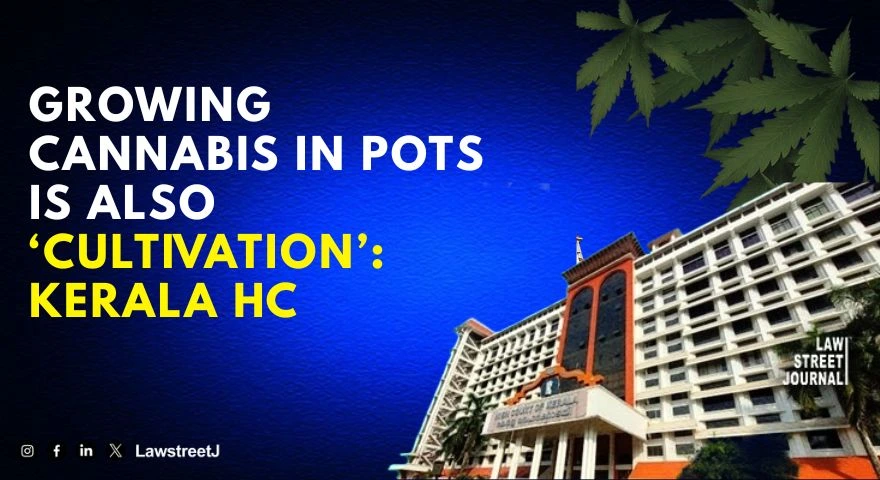Kerala: The Kerala High Court has refused to quash criminal proceedings initiated against a young man accused of cultivating cannabis plants and possessing ganja in violation of the Narcotic Drugs and Psychotropic Substances Act, 1985, holding that the allegations, taken at face value, disclose clear ingredients of the offences alleged.
The court of Justice C.S. Dias, delivering the order in Jatin v. State of Kerala (Crl.M.C. No. 8469 of 2025), ruled that the petition under Section 482 CrPC (now Section 528 of the BNSS) did not warrant interference, as the case involved disputed factual issues that could be resolved only during trial.
The prosecution case was that excise officials received reliable information that the petitioner was growing cannabis on the terrace of a rented building in Thiruvananthapuram. Acting on the tip-off, the officials conducted a search in the petitioner’s presence and seized five cannabis plants of varying heights, all grown in pots, along with 5 grams of ganja seeds and dried branches recovered from a bedroom allegedly occupied by him. Based on these recoveries, Crime No. 13/2025 was registered, and the matter proceeded as S.C. No. 1710/2025 before the Additional Sessions Court.
The petitioner argued that none of the seized plants qualified as “cannabis plants” within the meaning of Section 2(iv) of the NDPS Act because they lacked flowering or fruiting tops. He further contended that the Act criminalises only the “cultivation” of cannabis and not merely “planting” or “keeping” potted plants. According to him, cultivation implied growing crops in soil, not maintaining potted plants on a terrace. He also asserted that the seized 5 grams did not constitute ganja, as seeds and leaves are excluded from the statutory definition unless accompanied by flowering or fruiting tops. Finally, he claimed that he was no longer residing at the premises from where the contraband was seized, and thus no conscious possession could be attributed to him.
The Court, however, rejected these contentions. It observed that the statute clearly defines a “cannabis plant” as any plant of the cannabis genus, without reference to flowering tops, which become relevant only for determining whether the substance seized constitutes “ganja.” The Court further emphasised that Section 8(b) prohibits the cultivation of any cannabis plant, and Section 20(a)(i) imposes punishment for such cultivation.
To address the contention that growing plants in pots does not amount to cultivation, the Court referred to The Law Lexicon (4th Edition, 2017) and Stroud’s Judicial Dictionary (7th Edition, 2008), which interpret “cultivate” to include raising, tending, growing, or nurturing plants. Stroud specifically notes that growing cannabis plants in pots at a bedroom window has been recognised as cultivation. The Court also relied on the earlier Kerala High Court decision in Kunju v. State of Kerala (1988 (2) KLT 672), which held that cultivation of cannabis is an independent punishable offence irrespective of the presence of flowering tops. Drawing from these definitions and precedents, the Court held that cultivation encompasses the deliberate nurturing or raising of cannabis plants, regardless of whether they are grown in open soil or in containers.
Regarding the remaining arguments, the Court held that the petitioner’s claims—whether he resided at the premises, whether the seized material constituted ganja, and whether the plants were cultivated by him—were factual matters requiring evidence and cross-examination.
It further held that, at the stage of considering a petition for quashing, the Court cannot conduct a mini-trial or evaluate the sufficiency of evidence. Since the FIR, complaint, and seizure materials prima facie disclosed offences under Sections 8(c), 20(a)(i), and 20(b)(ii)(A), the Court declined to invoke its inherent powers.
Consequently, the petition was dismissed.
Appearance: The petitioner was represented by Sri. Suman Chakravarthy, Smt. K.R. Rija, Smt. Brejitha Unnikrishnan, Smt. Surya R., Shri. Sudeesh K.E., and Shri. Prahladh S.P., Advocates; while the State was represented by Sri. C.S. Hrithwik, Senior Public Prosecutor.
Case Title: Jatin v. State of Kerala




![Kerala HC Quashes 498A Dowry Harassment Case Against Live-In Partner, Citing Lack of Relative Status [Read Order]](/secure/uploads/2023/08/lj_5693_1057c042-1e57-4e27-8c9e-25af0ec38ec4.jpg)
![Watching porn on mobile: Kerala HC highlights importance of mother cooked meals, outdoor sports [Read Order]](/secure/uploads/2023/09/lj_9155_Parental_supervision_of_mobile_phone_usage.jpg)
![Lakshadweep MP Mohammed Faizal Disqualified from Lok Sabha After Conviction Suspension Plea Rejected by Kerala High Court [Read Notice]](/secure/uploads/2023/10/lj_9640_87b5fd97-0e05-4ff8-9a99-3be1e4446192.jpg)




